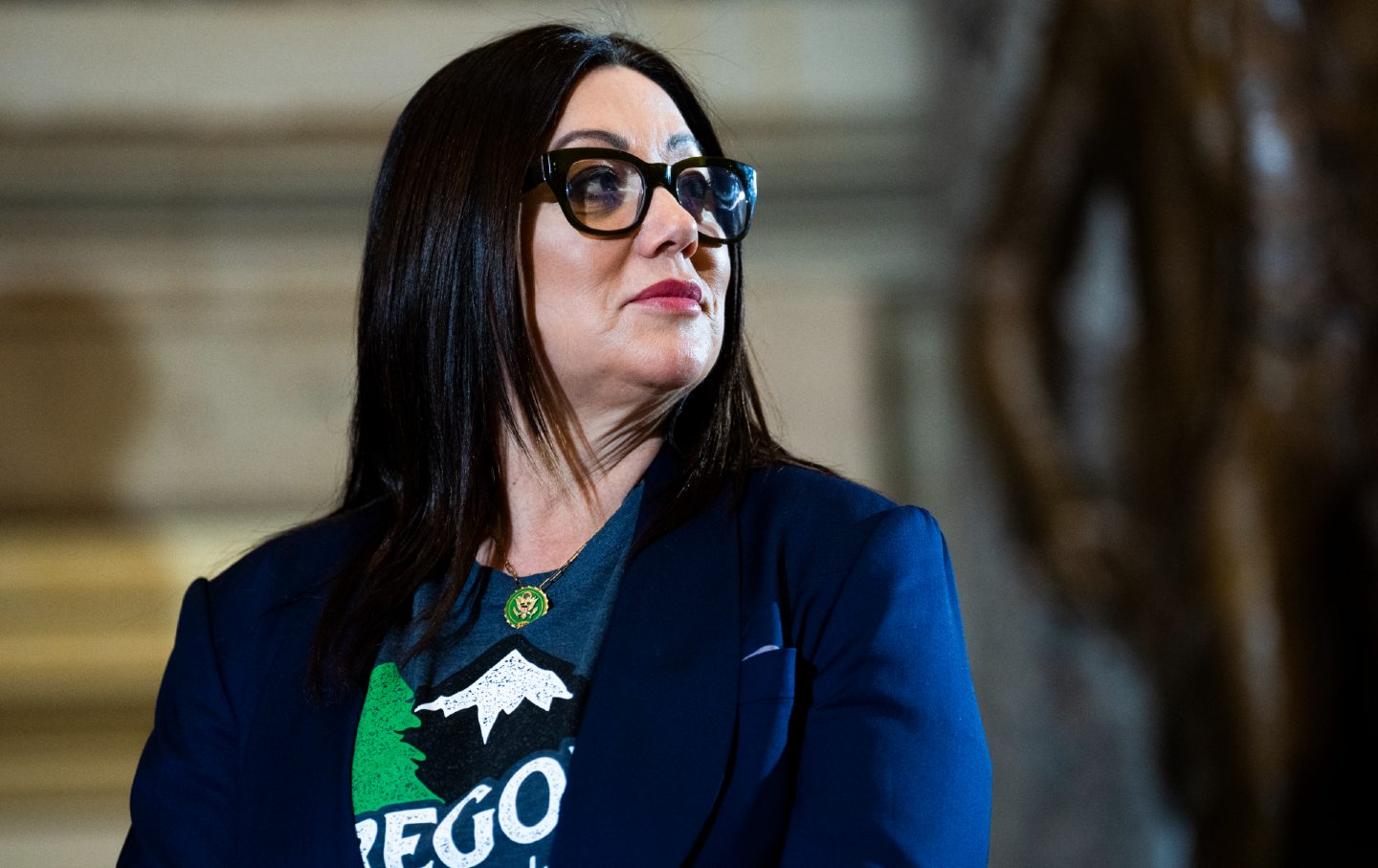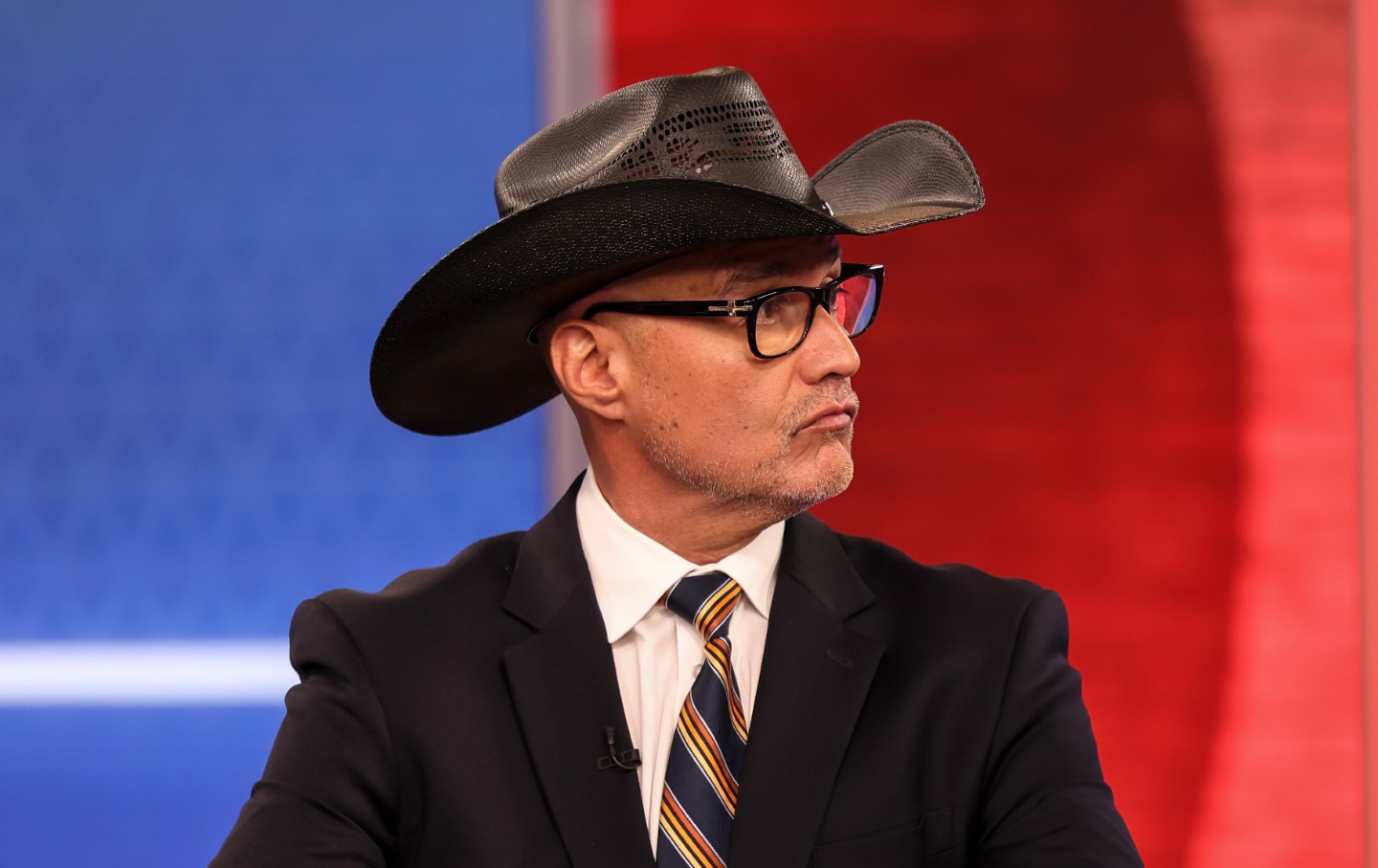The Encouraging Lesson From DeSantis’s Crash
The Florida governor isn’t just personally unlikable. His extremist policies are deeply unpopular, too.

Republican presidential candidate Florida Governor Ron DeSantis drives a bumper car as his daughter Madison laughs at the Iowa State Fair on August 12, 2023, in Des Moines, Iowa.
(Jeff Roberson / AP Photo)This time last year, political commentators were hotly anticipating the opening act of the 2024 GOP primaries: a battle royal between former president Donald Trump and his fastidiously groomed ideological successor, Florida Governor Ron DeSantis. Trump’s excesses, theatrics, and legal challenges were starting to look like an albatross for a Republican Party that had drastically underperformed over the previous three election cycles, and DeSantis, a founding member of the congressional Freedom Caucus, seemed like the tailor-made solution to the GOP’s political woes. During a grim 2022 midterm cycle, the Florida governor cruised to a 20-point reelection victory, touting the state’s sound economic condition and his roster of base-pleasing culture-war gambits, from anti-CRT and “Don’t Say Gay” bans in state schools to his resistance to “Faucism” during the height of the Covid-19 pandemic. His later immigration-relocation stunts and camera-ready showdown with the Disney Corporation were clearly calculated to burnish his hard-right bona fides as he prepared to subdue MAGA King Trump and declare himself the new monarch of the grievance-addicted GOP base.
In the cold light of the 2023 solstice season, the boom in DeSantis speculation seems like an exercise in pundit wish fulfillment: a determined effort to will the GOP’s Trump cult into a consistent ideology. As the past year has documented in excruciating detail for Team DeSantis, the personality-driven mass adoration of Trump can’t be reduced to a legislative résumé or a set of policy formulas. The pledge to “make America Florida,” to cite DeSantis’s own MAGA-riffing campaign mantra, just served to underline the unshakable longing among the party’s base to make America Trump country. With the Iowa caucus weeks away, DeSantis is trailing the former president by more than 30 points in the polls; the only reason he’s not running behind Nikki Haley, the rising Trump alternative du jour, is that he’s netted the endorsements of traditional Republican kingmakers in the state like Governor Kim Reynolds and evangelical activist Bob Vander Plaats.
The DeSantis campaign’s dramatic underperformance seems to puzzle right-wing pundits. The candidate’s struggles are chiefly a matter of “unrewarded excellence,” writes Philip Wegmann in a long and admiring caucus-eve Real Clear Politics profile. Far from demoralizing Trump’s fan base, the front-runner’s long train of legal setbacks—culminating most recently in the Colorado state Supreme Court’s decision to deny him a ballot spot thanks to the anti-insurrection clause of the 14th Amendment—have only sharpened and galvanized the GOP primary electorate’s devotion to him. DeSantis’s original strategy of highlighting the differences between Trump’s Covid response and his own has fizzled out as a result. Debate moderators have asked “exactly one question even involving Covid,” DeSantis complained to Wegmann, adding that, in any event, Trump himself has artfully dodged the issue as he’s made the whole primary thus far a referendum on his person and personality: “The former president, because he won’t debate on the stage, has not had to defend his record.”
Add to these basic problems of media access and bandwidth the DeSantis campaign’s own copious self-inflicted wounds, starting with DeSantis’s comically disastrous rollout of his presidential bid on Twitter, which involved a host of tech glitches and protracted delays, instantly deflating weeks’ worth of advance hype. Lately, the lavishly funded Never Back Down super PAC aligned with the campaign has imploded, leaving the candidate to feebly and disingenuously disclaim any responsibility for its ill-timed collapse. “I don’t have control over it, and that’s the problem with how this is set up,” DeSantis told Wegmann. “If I controlled it, I would own it, and I would obviously have run it in a good way. It’s just an independent group, and so the dynamics there are things that I just have no visibility into whatsoever.” DeSantis’s extensive Iowa ground game, targeting all 99 counties in the state with sustained grassroots outreach, has likewise been a bust, according to a detailed New York Times account. The candidate himself is also far from a natural on the campaign trail, as the growing catalog of awkward photo ops and social-media memes have made painfully clear.
Yet these structural obstacles, forbidding as they’ve been, mask a much bigger problem with DeSantis’s push for the presidency: its core pitch of giving voters a more disciplined and policy-minded version of Trumpism is simply unpopular. Take DeSantis’s signature culture-war initiative of transforming Florida schools into a manufactory of right-wing agitprop. The GOP went all in for the school-wars strategy in the wake of Virginia Governor Glenn Youngkin’s successful 2021 campaign; yet that has consistently failed to yield meaningful election-day victories. Indeed, as Jennifer Berkshire has written for The Nation, Youngkin’s own school-themed campaign was seriously misinterpreted as a monolithic work of red-meat Kulturkampf; in reality, the candidate pledged to promote public-funded magnet schools and advance the largest public investment in education in the state’s history.
DeSantis and other leading figures on the MAGA right failed to heed that moral, as DeSantis himself drove home in his recent, whiny debate performance with California Governor Gavin Newsom. In addition, DeSantis’s ban-driven model of education policy is sparking a backlash in the state. Meanwhile, the ballyhooed Florida-based group of school inquisitors, Moms for Liberty—which DeSantis elevated by appointing one of cofounders to a state ethics commission—is mired in a tawdry sex scandal.
Or take abortion. In an effort to furnish yet more red meat to the GOP base, DeSantis signed a six-week abortion ban into law this spring, more than halving the state’s prior 15-week ban into a time window where many women don’t even know whether they’re pregnant. The governor may have thought this was another grand act of primary season résumé-polishing, but the Republican drive to functionally ban abortion and coerce motherhood is also deeply unpopular, as virtually all post-Dobbs elections plainly show. Florida itself is on course to get a constitutional referendum to protect abortion rights on the ballot next November, with more than 150,000 Republicans included among the 1.3 million total signatories to the petition approving the initiative. Part of the reason that Trump would be such a viable candidate for the general election is that he’s been deliberately cagey about supporting draconian abortion bans. The same is true of Haley’s otherwise content-challenged mini-primary surge.
On immigration as well, DeSantis has opted for maximum punitive action, at the expense of his state’s own economic prospects. Florida has the second-lowest unemployment rate after Texas, and that labor shortage has unsurprisingly attracted a slew of immigrants, documented and otherwise, to the state. This spring, DeSantis also signed a harsh new set of immigration crackdowns into law, including an inhumane provision that designates any assistance lent to undocumented immigrants as a felony. On the debate stage, he’s voiced support for demented GOP proposals to invade Mexico over the fentanyl crisis, and has repeatedly intoned, with the creepy relish of a sadistic private school headmaster, his carefully rehearsed pledge to hunt down Mexican cartel leaders and kill them “stone cold dead.” While immigration scare-mongering admittedly, and regrettably, remains a popular GOP primary refrain, the broader polling on the issue shows overwhelming popular support for humane policies, such as granting a pathway to citizenship for undocumented immigrants—to the tune of 70 percent. Support for naturalizing native-born children of undocumented immigrants is even higher.
So much, in other words, for the “Make America Florida” project. Indeed, one key reason DeSantis has managed to argue himself into that deeply untenable initiative is that Florida on his watch has become something of a Potemkin model of right-wing governance. Along with all the other authoritarian entries in his governing portfolio, DeSantis has signed into law severe restrictions on ballot access and has overseen a gerrymandering scheme that’s since been found unconstitutional. What this means in practical political terms is that DeSantis’s claims to runaway success, together with the legislative GOP supermajorities that have supinely enacted his agenda in the state, are something of a mirage. The moment DeSantis’s program was on course to reach a national audience, it was destined to flame out, regardless of the internal machinations of super PACs, donor cattle calls, Iowa ground games, and the like. And for all of DeSantis’s richly deserved anguish and humiliation on the national stage, that’s also an encouraging moral for the rest of us.








